Christ is risen! Truly He is risen!
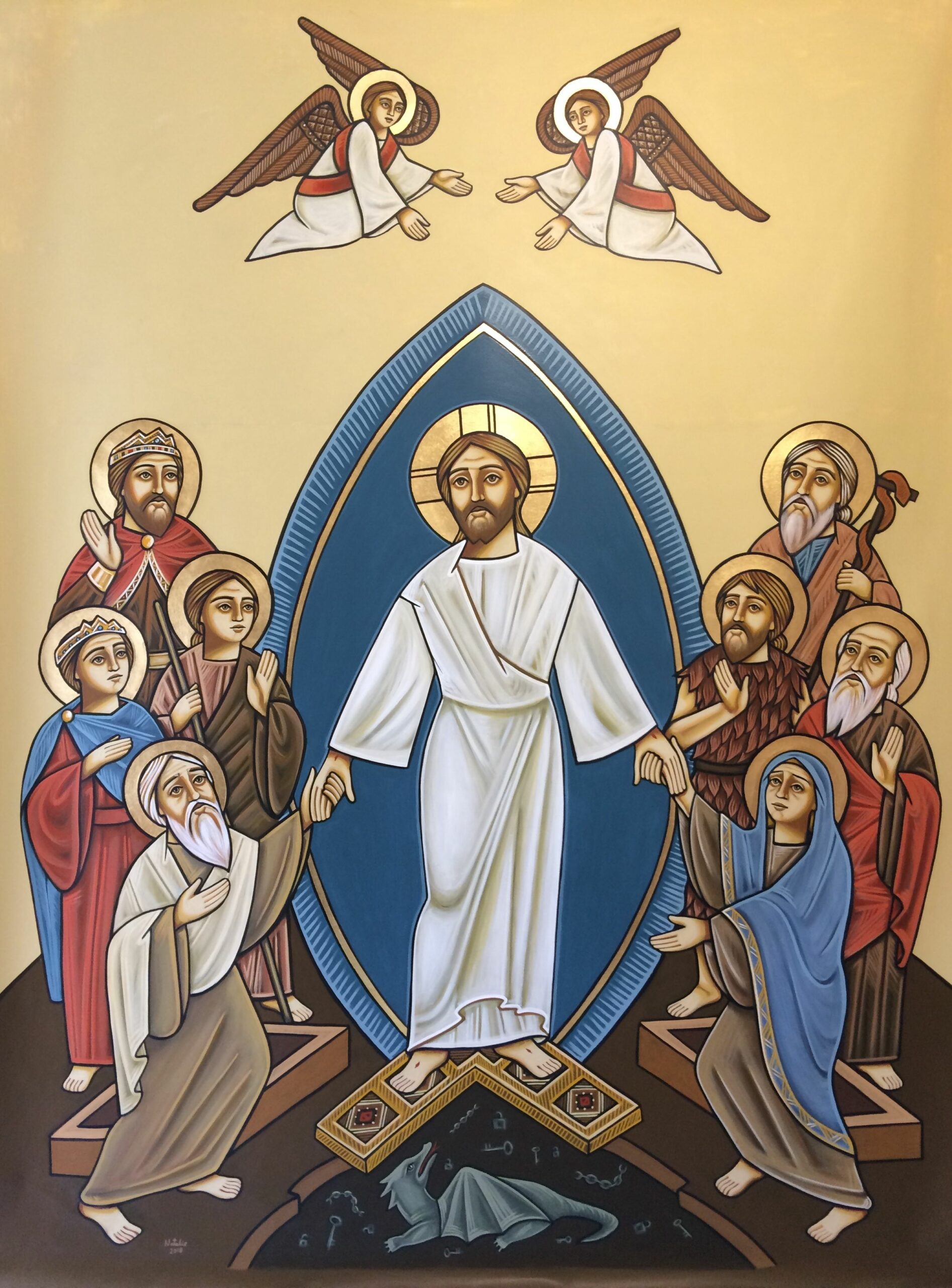 This is a contemporary Coptic Orthodox icon.
This is a contemporary Coptic Orthodox icon.
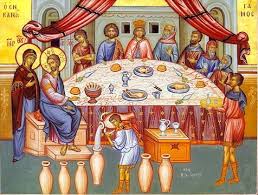 Before we proceed, I have a complaint, which I made the last time I wrote this Pascha series – and nothing has been done about it. So now I have two complaints, about the following:
Before we proceed, I have a complaint, which I made the last time I wrote this Pascha series – and nothing has been done about it. So now I have two complaints, about the following:
I think the story of the Wedding in Cana of Galilee is one of the best in the Gospels. It is so sweet, so captivating, so deep, and contains so much good teaching. It so beautifully illustrates a side of Christ’s nature which we may easily miss. And it shows the (how shall I say this?)… the “relaxed, good natured, give-and-take” relationship between Jesus and His Mother. (I think many people misread their dialogue here.)
So why ever do we Orthodox read this story on the Second Monday after Pascha, when almost nobody is in church to hear it? Big mistake. I know many of you follow the Lectionary on your own. Good for you! But, oh, I wish everybody could hear this on a Sunday morning.
So I pointed this out to the Church Fathers who set up our Orthodox lectionary those many centuries ago – and have they done anything about it? No! And, of course, Orthodoxy being Orthodoxy, it will never happen. The only thing I know to do is this:
Very soon (I think on the Sunday after Pentecost) I’m going to write a Post on the Wedding in Cana.
The Samaritan Woman
I love this story, because:
1 The dialog is written so beautifully. T he Apostle John would have made a great dramatist.
he Apostle John would have made a great dramatist.
2 So much fine teaching is crammed into this short story.
3 I can see a quiet gleam in the Lord’s eyes as He so cleverly, so carefully “works” this Woman, so to speak, leading her higher and deeper – all unknowing to her till the end.
4 And thereby we see how He is doing the same with us – have you noticed? If not, you will. We’ll come to that.
________________________________________________
This Sunday’s Gospel: John 4:5-42
The Contact
Jesus and His disciples were traveling through Samaria, north of Jerusalem, 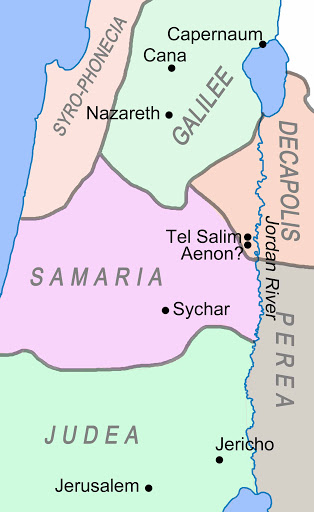 on the way to Galilee. Now, good Jews did not go through Samaria. Samaritans were lower class people whom the Babylonians had not bothered to take into Exile, and during that time they had gone heretical. The Jews despised them so much that they wouldn’t even talk to them. They traveled miles out of their way, west along the sea or east along the Jordan in order to avoid…ugh… Samaritans.
on the way to Galilee. Now, good Jews did not go through Samaria. Samaritans were lower class people whom the Babylonians had not bothered to take into Exile, and during that time they had gone heretical. The Jews despised them so much that they wouldn’t even talk to them. They traveled miles out of their way, west along the sea or east along the Jordan in order to avoid…ugh… Samaritans.
However, Jesus took His disciples straight through Samaria! – they probably wondering “What in the world are we doing here?!” They stopped at Sychar, near Jacob’s well. The disciples went into town to get lunch. Jesus remained behind – and perhaps John, too? This might explain why he’s the only Gospel writer to report this story.
At Noon a woman came to draw water. Tradition said it was at Noon that the serpent began to tempt Eve. Now comes a reversal. Jesus said to her, “Give me a drink”. She answered, “Why do you, a Jew, speak to me, a Samaritan woman?” – emphasizing both words, because good Jewish men did not freely associate with women. let alone strike up conversations with them. *
- Might there possibly be a moral here? Should Orthodox avoid dialogue with… ugh…people we disagree with? Or even worse should Republicans and Democrats (heaven forfend!) talk with each other ?
Jesus broke a whole lot of conventions, didn’t He? I wonder if He still does.
A Jewish morning prayer begins:  “Blessed are you, Lord our God, ruler of the universe, who have not created me a woman.” I wonder if that originally meant only: Thank God I don’t have to carry and give birth to children. (God bless women for going through all that!) No matter, some men have used it as a “putdown”
“Blessed are you, Lord our God, ruler of the universe, who have not created me a woman.” I wonder if that originally meant only: Thank God I don’t have to carry and give birth to children. (God bless women for going through all that!) No matter, some men have used it as a “putdown”
Above: the well at Sychar today
In this particular woman, the Lord obviously saw someone who had great possibilities – for remember that “He knew what was in a man”. John 2:25 And in a woman, too.
So now He begins to work on her.
The “Come On”
The Woman has come to get water. He starts with her where she is: “Give  me a drink.” She is startled for reasons we gave above. He’s got her attention. He proceeds: “If you knew what God can give you and who I am, you would have asked Me to give you living water”. She has no idea what He’s talking about. “Sir, you don’t even have a bucket. Do you think you’re greater than our father Jacob who gave us this well?” Yes, He does. And He is.
me a drink.” She is startled for reasons we gave above. He’s got her attention. He proceeds: “If you knew what God can give you and who I am, you would have asked Me to give you living water”. She has no idea what He’s talking about. “Sir, you don’t even have a bucket. Do you think you’re greater than our father Jacob who gave us this well?” Yes, He does. And He is.
Startled. Perplexed. This is often our reaction when God begins to work on us. (It certainly was with me when God first made His move on me.) And we don’t “get it”. What we’re interested in is “water” – material gain, getting ahead, power, advantage, whatever. Lord, I want that toy for Christmas. Or later: I would like you to get me that woman or that man, or that job, or… And also, who do you think you are? Do you think you’re greater than Santa Claus? or Dow Jones? or “Ask Amy”?
He leads her deeper.
“Whoever drinks of this water will thirst again. But the water I give will be a fountain welling up eternally.” I can give you never-ending refreshment. He means the Holy Spirit. He’s got her interest now. Imagine how this would sound to someone who had to walk a ways out of town every day, then draw water with a bucket and carry it back. “Sir”, says the woman,  “give me some of this water”. I don’t know who you are or how you could do it, but this sounds wonderful, especially in this noonday heat.
“give me some of this water”. I don’t know who you are or how you could do it, but this sounds wonderful, especially in this noonday heat.
Keep in mind that to the Woman He’s just a passing stranger. She has no idea who He is. God strikes up extended conversations with people, speaking to us through the Scriptures or the words of the Divine Liturgy, speaking to us through the people around us, or directly in our heart and mind, planting desires and hopes in us, long before we know who He is or what He’s up to.
He makes her squirm.
Now that He’s got her attention, and she’s getting interested, He hits her where it hurts. “Go, bring your husband and come here”. She answers, casually, “Sir, I  have no husband”. He answers (I paraphrase): You said that right! You’ve had five husbands *, and now you’re just living with some guy! She gasps: This is getting personal. This man knows too much. “Sir”, she says, rather in a panic now, wondering what else He knows, “I perceive that you are a prophet.”
have no husband”. He answers (I paraphrase): You said that right! You’ve had five husbands *, and now you’re just living with some guy! She gasps: This is getting personal. This man knows too much. “Sir”, she says, rather in a panic now, wondering what else He knows, “I perceive that you are a prophet.”
- One must at least admire her idealism and tenacity. She kept thinking surely the next one would be better. Dear women readers, learn from the Woman of Samaria. Probably he won’t be.
You see, when we start to get seriously interested in Christ and what He can give us, He then begins to show us what this will cost us. This will not come easily. We will have to face up to our sins, our failings. For, though most of us don’t know it at the first, He has come to change us, how we live, how we think, even our tastes and how we feel – and usually we don’t care much for that.
She tries to divert Him.
The Woman of Samaria attempts to get the subject off herself and onto… How about Religion? Religion is always a good safe holy topic. Should we worship on this hill or that hill? Let’s talk about theology or Bible, or how we should hold our fingers when we make the sign of the Cross, or the development of Christian social teachings or liturgy or theology. Good and, for the most part, important things, but they can also be used as a diversion from what God has in mind: the development of me. Too many people lose themselves in Religion and never get around to the Real Thing.
But since He is a “prophet”, she does ask a serious religious question: “Our 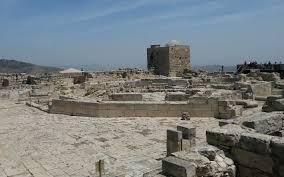 fathers worshiped on this mountain.” Right: Mount Gerizim, where Samaritans still worship. “You Jews say sacrifices should be made on Mount Zion.” Who’s right? Christ gives a straight answer, but one which doesn’t please her: We Jews are right. “Salvation comes from the Jews” – as indeed it did; Christ came from the Jews. “But the time is coming when true worship will be on neither mountain… when God will be worshiped in spirit and in truth.” Indeed. For nearly 2000 years now, the One True Sacrifice has been offered in churches all over the world, wherever we call down the Holy Spirit. The woman does not understand – little wonder – and what she does understand she doesn’t like: He had just told her that she has been living wrong and believing wrong, and her people were wrong. Likewise when He shows us that we have been wrong.
fathers worshiped on this mountain.” Right: Mount Gerizim, where Samaritans still worship. “You Jews say sacrifices should be made on Mount Zion.” Who’s right? Christ gives a straight answer, but one which doesn’t please her: We Jews are right. “Salvation comes from the Jews” – as indeed it did; Christ came from the Jews. “But the time is coming when true worship will be on neither mountain… when God will be worshiped in spirit and in truth.” Indeed. For nearly 2000 years now, the One True Sacrifice has been offered in churches all over the world, wherever we call down the Holy Spirit. The woman does not understand – little wonder – and what she does understand she doesn’t like: He had just told her that she has been living wrong and believing wrong, and her people were wrong. Likewise when He shows us that we have been wrong.
She pulls back. “When the Messiah comes he’ll explain this.”
He strikes!
“I who speak to you am He.”
All this time you have been speaking with the Messiah, with God in the flesh.
And suddenly she begins, only begins, to see Him for who He is. He has led her on, step by step, till she is now at the edge of true Faith. She runs into town: “I think I’ve found the Messiah.”
An Interlude: Now the Disciples don’t “get it”.
The Disciples return with lunch to find that Jesus has more important things than hummus and pita on His mind. “I have food to eat of which you do not know.” This has been spiritual food for Him: He is exulting: He sees Jews, Samaritans, Gentiles, all mankind ripe for harvest. He is feasting on the whole world brought to salvation. The disciples conclude: He doesn’t want to eat. Has someone else brought him lunch? (Duh…) You’ve got to wonder how Jesus ever had the patience. He had only three years to work with these guys and they were so slow. All of us human beings are so slow.
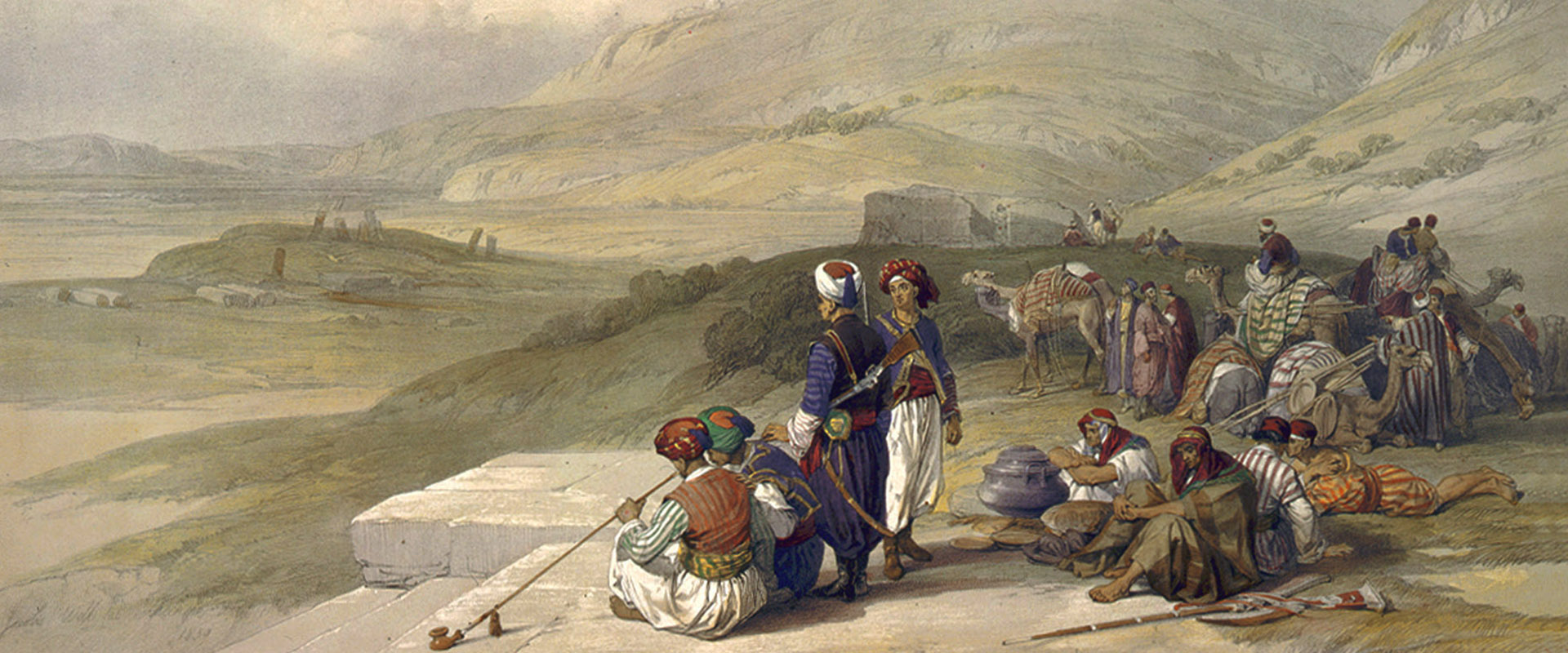
The disciples do not yet understand Him and His glorious Mission. The Gospel accounts tell how again and again they failed – and how patiently (OK, sometimes He got frustrated) He led them also step by step. At this point they seem to be even slower than the Samaritan woman, don’t they? She got it in a few minutes, but it took them years.
Sometimes it takes “religious people” longer than others to catch on to what this is really all about, even who He really is. I know of a man born Orthodox, the Parish Council chairman no less, who one Sunday heard his Priest preach about the divinity of Christ, and he came up to him after Liturgy and said very sincerely, “Jesus is God? I never knew that. Tell me more.” But much more commonly, we fail for a long time to absorb the fact that He has come to change us, remake us in His image. (“But I don’t want to be changed…”)
Back to the Samaritan Woman
It worked! Because of her, many villagers believed. They came out to see Him, and He stayed a while with them – with Samaritans. When the good people of Jerusalem heard about it, they must have been appalled, just appalled!
 Tradition says the Samaritan Woman brought her children and most of her relatives to Faith. I wonder how many children she had by how many husbands or whatever? which kid by which husband? Maybe even she couldn’t remember. But she changed her life. He changed her life.
Tradition says the Samaritan Woman brought her children and most of her relatives to Faith. I wonder how many children she had by how many husbands or whatever? which kid by which husband? Maybe even she couldn’t remember. But she changed her life. He changed her life.
After the Resurrection she was baptized taking the name PhotinI, (Pho-tin-EE), Φωτεινή) “Light”, because He had led her out of the darkness. The story says she was a sort of natural-born evangelist. She couldn’t stop telling people about Jesus, this amazing Man she had met by Jacob’s well, bringing many to Christ wherever she went. She and her family wound up in Carthage in North Africa.
Her enthusiasm finally got her into trouble. One of her sons, Victor, was in the military and was imprisoned in Rome because he was a Christian. So Photini took some of the family and went to the Emperor Nero himself and demanded Victor’s release. (Some advice: Never catch Nero on a bad day.) He had them all executed. One account says Nero had Photini thrown down a well, thinking that would be a clever and ironic thing to do. It sounds like him.
The Martyr Photini, Holy Photini, an image of what Christ can make out of us ordinary people if we let Him. He can lead us onward and upward step by step through life. He can take you and me, sinners that we are, shallow as we are, unperceiving as we are, imperfect as we are, and make us holy, change us into saints.
Next Week: Saint John the Dramatist writes again – The Man Born Blind.
Oh Father, this was SO UNBELIEVABLY GREAT!!! Thank you. I love your humor😉☦️
Thanks, Dori.
Me too . . . thank you for this post, Father Bill. While reading it, I had the thought that it would be interesting to hear you narrate this post and make it available in both an audio and your normal written formats. Could you try doing that, one time, to see how it goes? Thank you, again, and, by the way, Christ is risen! In Truth, He is risen!
Looking forward to your next post, God willing.
Thank you so very much, John. Life in retirement is just what I had been told – even busier than life pre-retirement, and I’m spending a lot of time on the Blog. But maybe I can find someone who can show me how to do it, so we’ll see…
I agree with Dori. This Gospel story has always been one of my favorites, and you have reaffrimed that love by bringing me ever deeper into it. Thank you for your beautiful writing and insight.